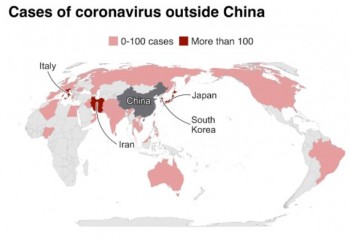Displaying items by tag: WHO
WHO gives Namibia recognition for almost eliminating HIV
The World Health Organisation (WHO) has announced that Namibia has become the first African nation, and the first high-burden country worldwide, to nearly eliminate mother-to-child transmission of HIV and hepatitis B. This achievement is especially notable because Namibia hosts over 200,000 people living with HIV, with the disease disproportionately affecting women. Despite these challenges, the country has achieved nearly universal HIV testing for pregnant women and a robust treatment system, which have reduced transmission by 70% in twenty years. In 2022, only 4% of newborns from HIV-positive mothers contracted the virus, while nearly 80% received a timely hepatitis B vaccine. The WHO has awarded Namibia a ‘silver tier’ for its hepatitis B efforts and a ‘bronze tier’ for HIV reduction. These accomplishments underscore the critical impact of committed leadership and effective public health strategies.
36 million people across the European Region may have developed long COVID over the first 3 years of the pandemic
According to the World Health Organization (WHO), an estimated 36 million people in the European region may have developed long COVID during the first three years of the pandemic. This condition, characterised by lingering symptoms post-COVID-19 infection, presents a significant public health challenge. The WHO's statement highlights the need for comprehensive care and support for those affected. Long COVID symptoms can vary widely, from fatigue and cognitive dysfunction to more severe physical issues, impacting daily life and work capacity. The organisation stresses that these long-term effects require serious attention and response from healthcare systems. The WHO's Regional Director for Europe, Dr. Hans Henri P. Kluge, emphasises the critical need to understand and address long COVID. He calls for sustained research efforts, investment in rehabilitation services, and public health strategies to manage and mitigate its impact. This situation reflects the pandemic's ongoing and evolving challenges, with long COVID affecting millions across the European region. It underscores the importance of continued vigilance, research, and healthcare system adaptation to meet the needs of those living with the long-term effects of COVID-19.
Avoiding employee burnout
Kintsugi Hope is a Christian charity making a difference to people’s mental wellbeing. 'Kintsugi' is a Japanese technique for repairing pottery with seams of gold. The word means 'golden joinery'. This repair makes the object more beautiful, unique indeed: Instead of hiding scars it makes a feature of them. Kintsugi Hope wants mental and emotional health to be understood in supportive communities where people grow and flourish, and is warning churches and Christian organisations about the danger of employee burnout. Faith groups are especially susceptible to burnout: because people are highly motivated working for God, more pressure is put on them. Kintsugi Hope is offering employers training on the problem. Also the World Health Organisation has published its first ever mental health guidance to employers to help them avoid employee burnout, and a new NHS scheme will provide therapists for the workplace.
Europe experiencing 'pandemic fatigue'
Covid is taking an emotional toll across Europe with rising levels of apathy among some populations, the World Health Organisation is warning. Survey data reveals the scale of this ‘pandemic fatigue’ has reached over 60% in some cases. Many people are feeling less motivated about following protective behaviours after living with disruption and uncertainty for months. WHO says, ‘Although weary, people must revive efforts to fight the virus. Until a vaccine or effective treatments are available, public support and protective behaviours - washing hands, wearing face coverings and social distancing - remain critical for containing the virus that is continuing its spread across the world in 188 countries and over one million deaths. It has come at an extraordinary cost, exhausting us all regardless of where we live, or what we do. It is easy and natural to feel apathetic and unmotivated, to experience fatigue.’
Europe: coronavirus second wave
Countries across Europe are seeing a resurgence in Covid-19 cases after successfully slowing outbreaks early in the year. Albania, Bulgaria, Czech Republic, Montenegro, and North Macedonia saw higher case numbers in August than they did earlier in the year. Belgium, Italy, and the UK, Europe's worst-hit countries, are seeing a resurgence but, so far, nothing like March and April. Of the three, the UK's figures look the most worrying. France, Poland, the Netherlands, and Spain are taking action to curb a second wave. WHO’s regional director hopes the number of confirmed infections worldwide, creeping towards 30 million, will serve as a wake-up call. He said, ‘We have a very serious situation unfolding before us. There have been five million confirmed cases and more than 228,000 fatalities across Europe since the pandemic began. But we can fight it again'. See
Global: pray for countries with new pandemic outbreaks
The WHO has sent out a fresh warning over the dangers of the new coronavirus, even as France staged an annual music festival and sent millions of children back to school. New outbreaks highlight the difficulties of fully eradicating the virus, even in role-model countries. Brazil confirmed over 39,000 new cases, with over 50,000 deaths altogether. The mayor of Mexico City cancelled plans to reopen businesses this week as the alert level remained at red. India and Pakistan have surges in infections and deaths; their healthcare systems are under strain. Iran fears a second wave of infections, with deaths having risen to 100 daily. Israel has a surge in cases, while Australia is sending 1,000 army personnel to assist with a spike in infections in Victoria. South Africa and Egypt have the largest African outbreaks, but testing is sparse in the continent - distorting how far the virus may have spread.
Europe: easing restrictions
Already the media are saying that a second, more deadly, wave of coronavirus is expected to hit Europe this winter. Europe's top WHO official, Dr Hans Kluge, warns that the second spike could coincide with outbreaks of other infectious diseases. He issued a stark warning to countries beginning to ease their lockdown restrictions, saying, ‘Now is the time for preparation, not celebration’; adding as the number of cases of Covid-19 in countries such as the UK, France and Italy begin to fall, it did not mean that the pandemic was coming to an end. The epicentre of the European outbreak is now in the east, with the number of cases rising in Russia, Ukraine, Belarus and Kazakhstan.
USA and the WHO
The world's worst health crisis in a hundred years is not the best time for the WHO to lose its largest financial supporter. The Trump administration says the WHO ignored early warnings about coronavirus spread, took at face value Chinese efforts to downplay it, and failed to send researchers into Wuhan for vital investigation at an early enough stage. Unless WHO shapes up to better serve ‘American interests,’ it will stop funding them in 30 days. Some are asking ‘Is WHO in need of urgent reform, or is it imperfect but better than any current alternatives?’ Also, WHO refused to provide information directly to Taiwan - which is excluded from WHO membership - out of respect for China's wishes, putting millions of Taiwanese at unnecessary risk. President Xi has pledged up to $2 billion to help the WHO's global pandemic response efforts.
Africa: coronavirus prevention action
On 15 February WHO prioritised support for thirteen African countries whose fragile health systems are already overwhelmed. It is critical to detect coronavirus early to prevent spreading within communities without the treatment capacity. Since 3 February African countries have been receiving technical guidance and advice on how to limit human-to-human transmission, so that they isolate and provide appropriate treatment to affected people. An Africa task force has been working with the WHO, screening points of entry, controlling in health-care facilities, advising on infection prevention and clinical management of people, laboratory diagnosis and community engagement. On 5 March five African countries had coronavirus - Nigeria, Egypt, South Africa, Senegal, and Algeria. See
CoVid-19 Virus alert level 'at its highest' - WHO
As we are going to print, Dr Mike Ryan, the WHO’s director of health emergencies, has explained that the global risk level of "very high" is the highest alert the organisation can declare.
He said earlier that it would be "unhelpful" to declare a pandemic when the world was still trying to contain the virus.
"If we say there's a pandemic of coronavirus we're essentially accepting that every human on the planet will be exposed to that virus. The data does not support that as yet," he said.
The World Health Organization is disappointed that it cannot provide more protective equipment to medical workers because of a global shortage, Dr Michael Ryan told a news conference in Geneva.
Here is a summary of the latest situation:
- The World Health Organization upgrades the global risk from the coronavirus to "very high"
- Stock markets across the globe are suffering their worst week since 2008
- The first British death from Covid-19 is announced in Japan
- Nigeria and Mexico confirm their first cases
- China confirms another 327 cases - the lowest daily increase for a month - and 44 deaths, mainly in Hubei
- New Zealand, Belarus, the Netherlands, and Lithuania confirm first cases
New infections outside China top those within (see map image)
Almost 80,000 people in China have been infected with the coronavirus - known officially as Covid-19 - since the virus's discovery in the city of Wuhan, Hubei province, in December.
Although the vast majority of cases of the respiratory infection, which causes pneumonia-like symptoms, remain in China, the virus is now spreading faster outside the country than inside.
The three biggest international outbreaks detected so far have been in South Korea, with more than 2,000 cases, on board the British-registered Diamond Princess cruise ship docked in Yokohama, Japan, which has seen more than 700 people infected, and Italy, with more than 640 confirmed cases.
The virus has pandemic potential
The jump in the number of daily confirmed cases internationally has raised fears the outbreak could become a pandemic - when an infectious disease spreads easily from person to person in many parts of the world.
The spread has reached a "decisive point" and has "pandemic potential", WHO head Dr Tedros Ghebreyesus says.
The US has declared the outbreak a public health emergency, the UK has deemed it a "serious and imminent threat" to public health and Japan has closed all its school
Medical researchers and scientists say it is too early to accurately predict how the virus will spread or calculate the death rate, partly due to mild cases remaining untested and unrecorded and a time lag of reporting infections.
As there is not yet a specific anti-viral treatment for coronavirus, people with the infection are currently being treated for their symptoms.
By Lucy Rodgers, Mike Hills, Dominic Bailey and Wesley Stephenson
More at: https://www.bbc.co.uk/news/topics/cyz0z8w0ydwt/coronavirus-outbreak
Pray: for all those affected by this as-yet not fully understood strain of the Coronavirus.
Pray: that the spread of the virus will be contained. Pray: that the economic impacts will be minimised.
Pray: for wisdom and insight for the medical researchers who are seeking both to build their understanding of the virus and the way that it mutates and to identify an effective inoculation and treatment.









